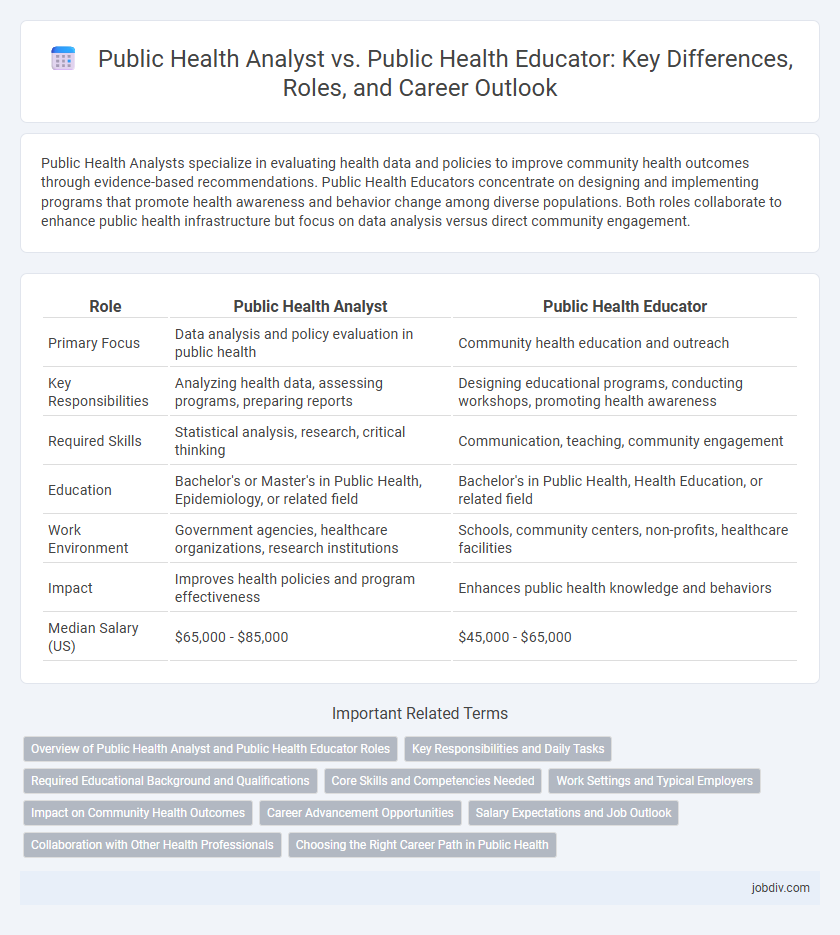Public Health Analysts specialize in evaluating health data and policies to improve community health outcomes through evidence-based recommendations. Public Health Educators concentrate on designing and implementing programs that promote health awareness and behavior change among diverse populations. Both roles collaborate to enhance public health infrastructure but focus on data analysis versus direct community engagement.
Table of Comparison
| Role | Public Health Analyst | Public Health Educator |
|---|---|---|
| Primary Focus | Data analysis and policy evaluation in public health | Community health education and outreach |
| Key Responsibilities | Analyzing health data, assessing programs, preparing reports | Designing educational programs, conducting workshops, promoting health awareness |
| Required Skills | Statistical analysis, research, critical thinking | Communication, teaching, community engagement |
| Education | Bachelor's or Master's in Public Health, Epidemiology, or related field | Bachelor's in Public Health, Health Education, or related field |
| Work Environment | Government agencies, healthcare organizations, research institutions | Schools, community centers, non-profits, healthcare facilities |
| Impact | Improves health policies and program effectiveness | Enhances public health knowledge and behaviors |
| Median Salary (US) | $65,000 - $85,000 | $45,000 - $65,000 |
Overview of Public Health Analyst and Public Health Educator Roles
Public Health Analysts specialize in data collection, statistical analysis, and policy evaluation to inform public health strategies and improve health outcomes. Public Health Educators focus on designing and implementing community-based programs to promote healthy behaviors and increase awareness of health risks. Both roles collaborate to support public health goals, but analysts emphasize data-driven decision-making while educators prioritize direct community engagement and education.
Key Responsibilities and Daily Tasks
Public Health Analysts evaluate healthcare data, develop policies, and assess program effectiveness to improve population health outcomes. Public Health Educators design and implement community education programs, promote healthy behaviors, and collaborate with organizations to increase public awareness. While analysts focus on data-driven decision-making and policy development, educators emphasize outreach and health communication strategies.
Required Educational Background and Qualifications
A Public Health Analyst typically requires a bachelor's degree in public health, epidemiology, or a related field, with many positions favoring a master's degree in public health (MPH) or health policy for advanced roles. Public Health Educators generally need at least a bachelor's degree in health education, community health, or health promotion, with certification such as the Certified Health Education Specialist (CHES) enhancing job prospects. Both careers demand strong analytical and communication skills, but analysts focus more on data interpretation and policy evaluation, whereas educators prioritize community outreach and health literacy programs.
Core Skills and Competencies Needed
Public Health Analysts require strong data analysis, epidemiology, and policy assessment skills to evaluate health programs and inform decision-making. Public Health Educators prioritize communication, community outreach, and behavior change strategies to promote health awareness and education at the population level. Both roles demand proficiency in research methods, cultural competency, and ethical standards to effectively address public health challenges.
Work Settings and Typical Employers
Public Health Analysts primarily work in government agencies such as the CDC, state health departments, and policy think tanks, focusing on data analysis and program evaluation to shape health policies. Public Health Educators are commonly employed by hospitals, community health organizations, schools, and non-profits, delivering educational programs to promote health awareness and disease prevention. Both roles may also be found in universities and private sector health organizations, but their work settings differ in emphasis on data interpretation versus direct community engagement.
Impact on Community Health Outcomes
Public Health Analysts evaluate data to identify health trends and inform policies that improve community health outcomes by targeting resources effectively. Public Health Educators design and implement educational programs that promote healthy behaviors and increase awareness, directly influencing individual and population health. Both roles synergistically enhance community health, with Analysts providing evidence-based insights and Educators facilitating behavioral change.
Career Advancement Opportunities
Public Health Analysts often experience career advancement by moving into senior data management or policy advisory roles, utilizing their expertise in epidemiological research and statistical analysis. Public Health Educators typically advance through positions in program coordination, community outreach leadership, or health communication strategy development. Both career paths offer opportunities for growth within governmental agencies, non-profits, and healthcare organizations, driven by rising demand for data-driven decision making and effective public health education campaigns.
Salary Expectations and Job Outlook
Public Health Analysts typically earn a median annual salary of approximately $75,000, reflecting their data-driven roles in health policy and program evaluation, while Public Health Educators have a median salary around $55,000, influenced by their focus on community outreach and health promotion. Employment growth for Public Health Analysts is projected at 11% over the next decade, driven by increased demand for data interpretation in healthcare, whereas Public Health Educators face a 13% growth rate due to ongoing public awareness campaigns and preventive health initiatives. Salary expectations and job outlook vary significantly based on education level, geographic location, and sector, with both professions playing vital roles in improving population health outcomes.
Collaboration with Other Health Professionals
Public Health Analysts collaborate closely with epidemiologists, biostatisticians, and healthcare administrators to analyze data and develop policies targeting community health improvements. Public Health Educators work alongside healthcare providers, social workers, and community organizations to design and implement educational programs that promote healthy behaviors. Both roles require strong interdisciplinary communication to effectively address public health challenges and enhance population well-being.
Choosing the Right Career Path in Public Health
Public Health Analysts specialize in data interpretation and health trend forecasting to inform policy decisions, emphasizing analytical and research skills. Public Health Educators focus on designing and implementing community-based programs to promote health awareness and behavioral change, leveraging communication and outreach expertise. Selecting the right career in public health depends on whether one prefers data-driven policy development or direct community engagement and education.
Public Health Analyst vs Public Health Educator Infographic

 jobdiv.com
jobdiv.com